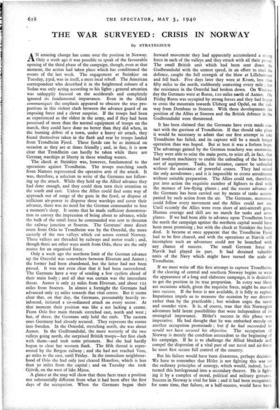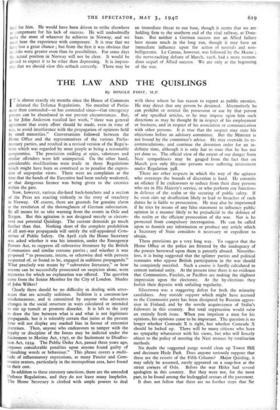THE WAR SURVEYED: CRISIS IN NORWAY
By STRATEGICUS
AN amazing change has come over the position in Norway. Only a week ago it was possible to speak of the favourable opening of the third phase of the campaign, though, even at that moment, the action had taken place which has conditioned the events of the last week. The engagement at Steinkjer on Tuesday, 23rd, was in itself, a mere local rebuff. The American correspondent who described it in the heightened colours of a Sedan was only acting according to his lights ; general attention was unhappily focused on the accidentals and completely ignored its fundamental importance. Even in the Allied communiqués the emphasis appeared to obscure the true pro- portions in this violent clash between the advance guard of an imposing force and a clever surprise. If the troops had been as experienced as the oldest in the army, and if they had been possessed of more than the normal equipment of troops on the march, they could have done no better than they did when, in the burning debris of a town, under a heavy air attack, they found themselves taken in the flank and rear by troops landed from Trondheim Fjord. These fjords can be as inimical on occasion as they are at times friendly ; and, in fine, it is now clear that Trondheim can hardly be taken while there are German warships at liberty in these winding waters.
The check at Steinkjer was, however, fundamental to the operations against Trondheim. The troops marching south from Namsos represented the operative arm of the attack. It was, therefore, a solecism to write of the Germans not follow- ing up the attack. While they held up the Allied advance they had done enough, and they could then turn their attention to the south and east. Unless the Allies could find some way of approach out of range of the guns in the fjord, or dispose of sufficient air-power to disperse these warships and cover their advance, there was no need for the German commander to lose a moment's sleep. It seems that he made sufficient demonstra- tion to convey the impression of being about to advance, while the bulk of the small force he commanded was sent to threaten the railway junction at Stoeren. The Germans' most direct route from Oslo to Trondheim was by the Osterdal, the more easterly of the two valleys which cut across central Norway. These valleys are threaded by railways and motor roads ; and, though there are other ways north from Oslo, these are the only routes for an organised force.
Only a week ago the northern limit of the German advance up the Osterdal was somewhere between Elverum and Aamot ; the former had been abandoned, but the latter had not been passed. It was not even clear that it had been surrendered. The Germans have a way of sending a few cyclists ahead of their main body ; and all that was certain was the immediate threat. Aamot is only 25 miles from Elverum, and about 125 miles from Stoeren. In almost a fortnight the Germans had advanced only 25 miles towards that vital centre. But it seems clear that, on that day, the Germans, presumably heavily re- inforced, initiated a co-ordinated attack on every sector. At that moment their position was like a net lacking a centre. From Oslo five main threads stretched east, north and west ; but, of three, the Germans only held the ends. The eastern ones Germany had already secured. They represent the routes into Sweden. In the Osterdal, stretching north, she was about Aamot. In the Gudbrandsdal, the more westerly of the two valleys going north, she surprised British troops—her first clash with them—and took some prisoners. But she had hardly begun to clear her western flank. The fifth thread is repre- sented by the Bergen railway ; and she had not reached Voss, 40 miles to the east, until Friday. In the immediate neighbour- hood of Oslo she had only just cleared Honefoss, which is less than 30 miles from the capital ; and on Tuesday she took Gjovik, on the west of lake Mjosa.
A glance at the map will show that these facts trace a position not substantially different from what it had been after the first days of the occupation. When the Germans began their forward movement they had apparently accumulated a St! ong force in each of the valleys and they struck with all their pc,A er. The small British unit which had been sent down the Gudbrandsdal with the utmost speed, in an effort to steel the defence, caught the full strength of the blow at Lillehammer and fell back. Five days later they were at Kvam, less than fifty miles to the north, stubbornly contesting every mile: but the resistance in the Osterdal had broken down. On Wednes- day the Germans were at Roros, Ito miles north of Aamot. On Friday Roros was occupied by strong forces and they had begun to cross the mountain towards Ulsberg and Opdal, on the rail- way from Dombaas to Stoeren. With these developments the position of the Allies at Stoeren and the British defence in the Gudbrandsdal were threatened.
It has been claimed that the Germans have even made con- tact with the garrison of Trondheim. If that should take place it would be necessary to admit that our first attempt to take Trondheim has failed, and its capture will be a much longer operation than was hoped. But at best it was a forlorn hope. The advantage gained by the German treachery was enormous. They were able to seize the main ports, to seize all, in fact, that had modern machinery to enable the unloading of the heaviest sort of equipment. Tanks, for instance, cannot be unloaded without the assistance of powerful cranes. They had seized the only aerodromes ; and it is impossible to create aerodromes without suitable preparation. The Allies could not, therefore, put into action the requisite number of fighters to deal with the menace of low-flying planes ; and the recent advance of the Germans has been carried out by means of tanks accom- panied by such action from the air. The Germans, moreover. could follow every movement and the Allies could not see. Until recently the Allies were even short of anti-aircraft guns. Human courage and skill are no match for tanks and aero- planes. If we had been able to advance upon Trondheim from the north the campaign against the northern capital would have been more promising ; but with the check at Steinkjer the hope died. It became at once apparent that the Trondheim Fjord had to be first cleared, and with the operations at Narvik still incomplete such an adventure could not be launched with any, chance of success. The small German force at Narvik had played its part. It had detained valuable units of the Navy which might have turned the scale at Trondheim.
If we must write off this first attempt to capture Trondheim, if the clearing of central and southern Norway begins to wear the appearance of a long and elaborate campaign, it is desirable to get the position in its true proportion. In every war there are occasions which, given the requisite force, might be nursed into success. If the force is not available, it is folly to repine. Impatience impels us to measure the occasion by our dreams rather than by the practicable ; but wisdom urges the saner and sounder view. It is, of course, true that this Norwegian adventure held latent possibilities that were independent of its strategical importance. Hitler's success in this phase was imperative. He had thought that he was embarked merely on another occupation promenade ; but if he had succeeded he would not have secured his objective. The occupation of Norway is merely the condition antecedent to the beginning of his campaign. If he is to challenge the Allied blockade and compel the dispersion of a vital part of our naval and air-force he must first secure full control of the country.
But his failure would have been disastrous, perhaps decisive. We have to remember that Hitler is not fighting this war en the ordinary principles of strategy, which would, indeed, ha turned this battleground into a secondary theatre. He is fight- ing it by a complex of moral, political and military gesture,. Success in Norway is vital for him ; and it had been recognised, for some time, that failure, or a half-success, would have beea fatal for him. He would have been driven to strike elsewhere to compensate for his lack of success. He will undoubtedly make the most of whatever he achieves in Norway, and we must bear the experience with composure: It is true that we have lost a great chance ; but from the first it was obvious that its risks were greater even than its possibilities. For some days the actual position in Norway will not be clear. It would be absurd to expect it to be other than depressing. It is impera- tive that we should view this setback correctly. There may be an immediate threat to our base, though it seems that we are - holding firm to the southern end of the vital railway, at Dom- baas. But neither a German success nor an Allied failure here means much in the long run, though it may have an immediate influence upon the action of neutrals and non- belligerents. Le Cateau, however, was followed by the Marne ; the nerve-racking defeats of March, 1918, had a more tremen- dous sequel of Allied success. We are only at the beginning of the war.



































 Previous page
Previous page